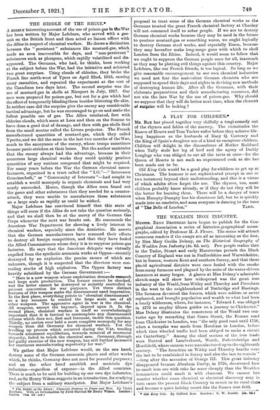WEALDEN IRON INDUSTRY.
MEsass. BEsur BROTHERS have begun to publish for the Geo- graphical Association a series of historico-geographical mono- graphs, edited by Professor H. J. Fleure. The series will attract numerous readers if the essays are all as interesting as the first, by Miss Mary Cecilia Delany, on The Historical Geography of the Wealden Iron Industry (4s. fd. net). Few people realize that in the Tudor, Stuart and early Hanoverian periods the Black Country of England was not in Staffordshire and Warwickshire, but in Sussex, western Kent and southern Surrey, and that these placid agricultural districts were once fouled with the smoke from many furnaces and plagued by the noise of the water-driven hammers at many forges. A glance at Miss Delany's admirable sketch-maps will show how widespread was the great iron industry of the Weald, from Witley and Thursley and Frensham in the west to the neighbourhood of Tonbridge and Hastings. The furnaces devoured the forests, which were seldom or never replanted, and brought population and wealth to what had been a lonely wilderness, where, for instance, " Edward I. was obliged in 1276 to employ fifteen guides on a journey to Chichester." Miss Delany illustrates the remoteness of the Weald two cen- turies ago by remarking that Stane Street, the Roman road from Chichester to London, was "the only good road until 1756, when a turnpike was made from Horsham to London, before which time wheeled traffic had been obliged to make a circuit via Canterbury." Among the chief centres of the iron trade were Buxted and Lamberhurat, Worth, Robcrtsbridge and Heathfield, where cannon were manufactured up to the eighteenth century. " The foundries on Witte), and Thursley heaths were the last to be established in Surrey and also the last to remain " —long after the accession of George III. This great industry disappeared because Abraham Darby, in 1738, discovered how to smelt iron ore with coke far more cheaply than the Wealden iromnasters could smelt it with charcoal. We cannot but wonder whether some chemical or electrical discovery may in turn cause the present Black Country to revert to its rural state and become a quiet holiday resort like the Sussex iron field.
• Old Sing Cok. By Clifford Rex. London C. W. Daniel. La& 411J










































 Previous page
Previous page